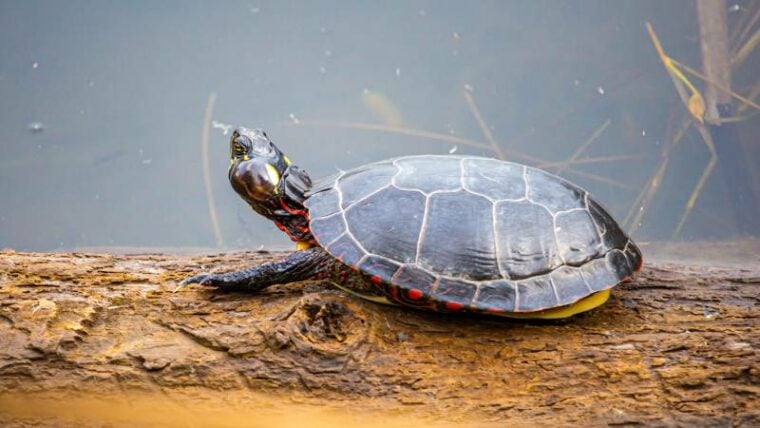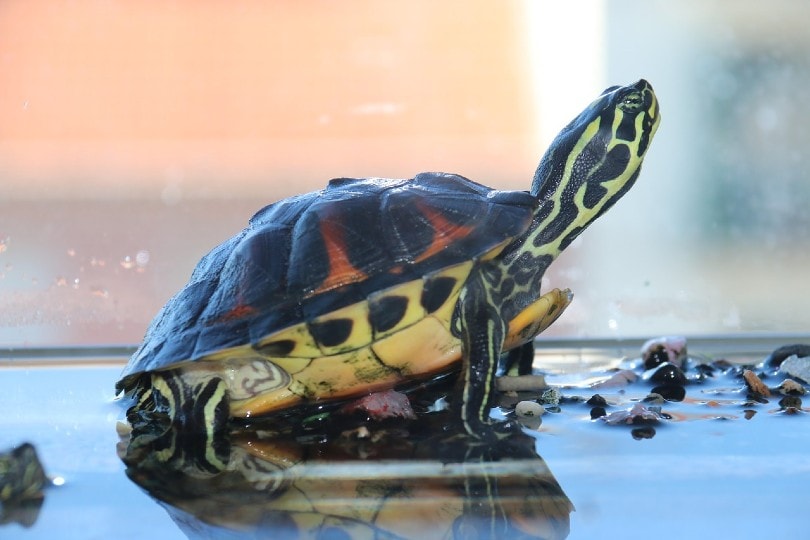
Turtles have become a trendy pet, for several reasons. They are quiet, relatively easy to care for, and provide decades of fun for their owners. However, when it comes to feeding your pet turtle, doubts can arise, and sometimes mistakes can be made out of ignorance and lack of knowledge.
So, how long exactly can turtles go without eating? This is usually one of the most common doubts among the keepers of this cute little reptile. A healthy adult turtle can easily go for several weeks without food, provided they have access to fresh, clean drinking water and appropriate lighting. Young turtles and juveniles aren’t capable of such prolonged periods of fasting and need to be fed properly on a daily or near-daily basis.
Keep reading and find out all there is to know about feeding your turtle so that your reptile has the best possible quality of life.
How Long Can Your Turtle Go Without Eating?
To answer this question that many turtle keepers ask themselves, it is essential to observe how often turtles should be fed, depending on their age:
However, turtles can fast for a few days after a heavy meal so that you can take a leisurely weekend away. Beyond that, someone will need to feed them and monitor that the filtration or heating equipment is working since these devices tend to break down in your absence! They also need access to fresh and clean drinking water at all times.

Leaving Your Turtle Alone for a Few Days
Your healthy adult turtle, placed in an escape and predator-proof enclosure or a garden pond, does not need to be “maintained” if you have to go away for a while. However, if the food naturally present in its enclosure is insufficient, you will have to add more and ask a neighbor or friend to replenish it with foliage.
What to Do If You Need to Leave for an Extended Period
If you decide to go on vacation and leave your turtles alone for more than 3 days, you must ask a friend and come and take care of your pet turtles in your absence.
Although a healthy adult turtle can theoretically survive without eating for several days or even weeks (when they enter hibernation mode, for example), it would not be responsible of you to leave them alone for so long. You never know what can happen in your absence. In addition, though they can survive without food for long periods of time, they will still lose body weight throughout the process.
Another critical parameter is that, usually, turtles are animals with a lot of appetites and can, at times, eat like real voracious people. On the contrary, if your turtle has no appetite and if it rejects food, you will have to bring it quickly to the vet. Sometimes this loss of appetite is due to an inadequate temperature or a dirty aquarium; you will have to be very careful with these two parameters.

Feeding a Domestic Turtle
The adequate amount of daily food for aquatic turtles is a fundamental topic because, as we said, they are animals that have an infinite appetite, which can lead us to make the mistake of thinking that they have hunger, which is not much the same.
The staple diet of a turtle varies by species and is something you should research before adopting your pet via reliable sources/literature or a consultation with an exotic vet. Generally speaking, turtles are omnivores; they eat both vegetation and obtain protein from animal sources as well. Tortoises, on the other hand, are herbivores and live only on vegetation.
Therefore, for turtles, you will need a base diet (such as a pellet diet) appropriate for the species you adopt alongside additional nutrition from food items that are appropriate for them based on their species, age, and nutritional requirements.
Tortoises usually don’t accept pellets readily and are often healthiest and happiest when offered appropriate grass, weeds, leafy greens, fruits, and flowers. However, as is the case with turtles, different species vary greatly in their nutritional requirements. Your pet’s diet is something you should discuss with your exotic animal veterinarian to ensure they receive nutrition that is both adequate and appropriate for them.
If you want to give live food, it could be a little complicated to manage. Indeed, some turtle keepers refuse to provide this type of food since it can be a bit dirty to handle. Anyway, it would be best if you remembered which species you have as a pet and its needs for a happy and healthy life.
Tips and Precautions During Your Absence
Going out and leaving just one turtle in its terrarium is always a significant risk. It can turn on itself and will not be able to get back on its feet; death is then guaranteed.
Under no circumstances should you hibernate a turtle if this is not the “right moment” under the pretext that you are going on vacation. The turtle hibernation season begins in November and ends in March (for turtles in the temperate zones of the Northern Hemisphere). Given the risks of leaving your pet unsupervised, it is best to hire a pet sitter or request the assistance of a friend or relative to check in on your pet while you’re away.

Final Thoughts
Healthy adult turtles can easily go several days without food, as long as they have access to fresh water and appropriate lighting. Although turtles do not have the same feeding needs as dogs or cats, you should not leave them unattended for extended periods of time, as there are other risks involved with unsupervised pets. Young or juvenile turtles need frequent daily or near-daily feedings. Though adult turtles have a remarkable ability to manage themselves in the absence of food, they still require and benefit from social interactions from you to have an optimal quality of life.
Featured Image Credit: Colin Temple, Shutterstock









